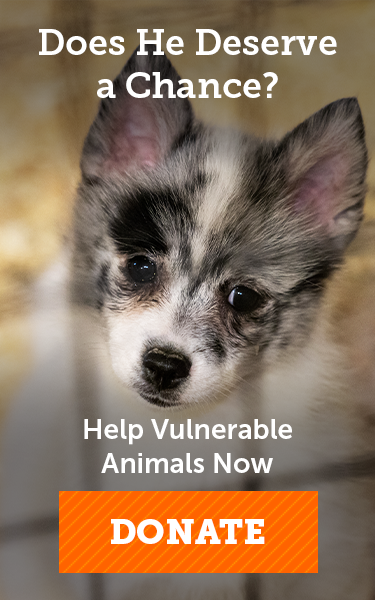ASPCA Announces New Grant Funding to Support Cutting-Edge Research to Benefit Animals
Seeking proposals now through June 30 for high-quality research to help improve the lives of animals either directly or through systemic changeNEW YORK, NY – The ASPCA® (The American Society for the Prevention of Cruelty to Animals®) has announced more than $400,000 in grant funding available to U.S. and Canadian organizations to support research that either directly or systemically could benefit animals, with a focus on projects that examine cruelty, access to veterinary care, applied behavior, psychological trauma, and farm animal welfare. As the nation’s leading voice for animals for more than 150 years, the ASPCA is deeply committed to improving the lives of at-risk dogs, cats, equines, and farm animals across the United States, and research is a key element to understanding, informing, and taking action to address or improve animal welfare.
Millions of animals across the U.S. face challenges to their wellbeing each year, from cruelty to homelessness and lack of access to veterinary care, as well as those suffering on cruel factory farms. The ASPCA is reimagining how the animal welfare and veterinary fields can best serve animals, pet owners, and communities by dedicating its resources and expertise to the animals who need it most. To address some of the most urgent issues facing the animal welfare community, the ASPCA is seeking proposals for Research Grants in the following categories:
- Cruelty Research: Research that heightens awareness of animal cruelty and/or informs cruelty prevention and response, including projects that analyze the effectiveness of legislative and other policy measures.
- Access to Veterinary Care (AVC) Research: Research that addresses access to veterinary care that will establish tools or guidelines that professionals or organizations can use to improve access to care.
- Applied Behavior Research: Research that informs specific, evidence-based behavior protocols in shelters that lead to euthanasia.
- Psychological Trauma Research: Research related to developing novel approaches to the documentation of animal cruelty and neglect in the absence of physical trauma, with an emphasis on objective measures, including biomarkers and quantitative behavioral phenotyping.
- Farm Animal Welfare Research: Research related to animal welfare conditions in the largest U.S. poultry industries that produce broiler chickens, egg-laying hens, and turkeys.
“While the modern challenges facing animals are wide-ranging and complex, the ASPCA tackles these challenges head-on and in innovative ways, including providing vital veterinary care, responding to disasters, pioneering adoption and behavioral rehabilitation programs, conducting critical animal welfare research, training law enforcement and shelter professionals, educating consumers and the public, and advocating for more effective laws,” said Maya Gupta, senior director of research at the ASPCA. “The research funded by this grant program helps us gain more understanding of some of the biggest issues facing animals in our society, and has the potential to inform innovative strategies to improve the lives of animals and the people who care for them.”
“The funding we received from the ASPCA’s Research Grant helped us launch a new research arm at the University of Denver’s Institute for Human-Animal Connection, aimed at understanding community engagement practices within animal law enforcement,” said Kevin Morris, Executive Director of the Institute for Human-Animal Connection and 2023 research grant recipient. “Our new portfolio of quantitative and qualitative research is critical for informing policies that protect the health and well-being of pets and their families in all communities.”
Grant funding is only one of many ways the ASPCA supports organizations and communities across the country. The ASPCA is one of the nation’s largest animal welfare grant makers, and since 2001, the ASPCA has provided more than $200 million in grant funding to over 3,500 animal shelters, municipal and governmental agencies, rescue groups, universities and other mission-aligned organizations and programs nationwide. These funds support a variety of programs ranging from increasing pet adoptions to helping communities build strong programs that assist animals during natural disasters, improving access to veterinary care, and partnering with food banks to serve more than 4.3 million pet food meals since 2017. ASPCA research grants specifically have supported more than 40 organizations nationwide in conducting groundbreaking and thought-provoking research, with projects from past recipients that include: Market Access and Competition in the U.S. Veterinary Service Industry (Steinbach Consulting and Research LLC); Incorporating Video Telemedicine for Improved At-Home Management of Chronic Health Conditions in Cats: A Focus on Degenerative Joint Disease (University of California Davis); Reducing Kennel Reactivity in Shelter Housed Dogs (Arizona State University); Farm Animal PTSD (Farm Sanctuary).
Applications for the 2024 ASPCA Research Grants will be accepted from February 15-June 30, 2024, and the ASPCA Research Grants team will be hosting a one-hour open house on Thursday, February 29th at 2:00 p.m. ET to answer questions related to the submission process and criteria. Proposals can come from investigators or research teams affiliated with U.S. public or private entities, as well as eligible Canadian organizations that can demonstrate the applicability of the research to improve the welfare of animals in the U.S. Proposals will be evaluated based on their significance and relevance, approach, potential impact, generalizability, credentials, and budget.
For more information about the eligibility requirements or to submit a proposal, please visit www.aspcapro.org/researchgrants. If your organization is interested in research but does not currently have the capacity to conduct formal research on its own, the ASPCA may be able to offer networking or guidance. To learn about ways to pursue your research ideas, please email [email protected].

